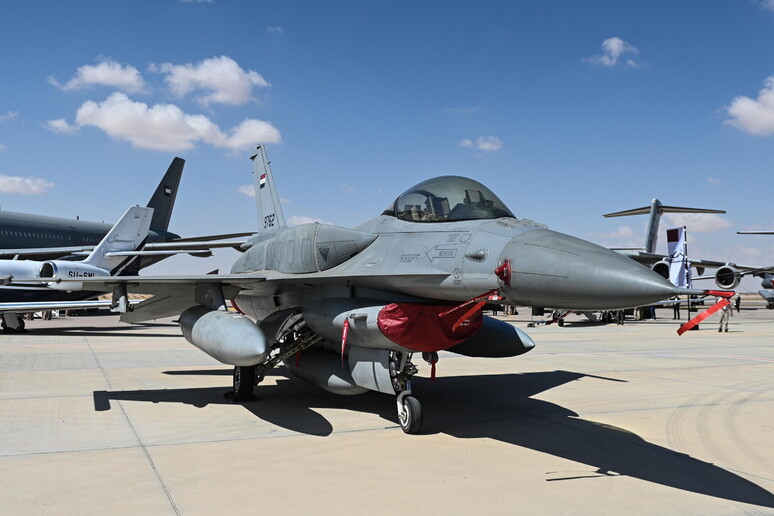Europe is amidst a rearmament effort
in the wake of the ongoing full-scale Russian invasion of
Ukraine. Now that the United States is no longer viewed as a
guaranteed reliable partner under President Donald Trump, should
American companies continue to supply European militaries?
"We are moving decisively towards a strong and more sovereign
Europe of defence," European Council President António Costa
declared recently after a crisis summit of EU leaders to
greenlight a rearmament plan against the rising threat from a
revanchist Russia.
"We are putting our money where our mouth is," the former
Portuguese prime minister underlined.
A pressing question facing the European Union however is where
to spend this money. Should the billions go to defence companies
in Europe or in America?
What is the plan?
EU leaders, shaken by the prospect of United States
disengagement from the bloc's security, and US President Donald
Trump's clash with Ukrainian President Volodymyr Zelenskyy in
the White House, backed a plan to boost the bloc's defences and
military support for Ukraine as it continues to resist Russia's
invasion.
The plan is a dramatic ramp-up in defence spending, mobilising
800 billion Euro over the next four years, including 150 billion
Euro in loans for arms projects raised by the European
Commission on capital markets and guaranteed by the EU budget,
and allowing exemptions from EU debt rules for EU member states
for defence investments.
Other measures to unlock more money start with a reform of the
EU cohesion funds to remove restrictions on their use for
defence, a role for the European Investment Bank (EIB), and the
mobilisation of private funding thanks to the completion of the
Capital Markets Union.
Money to burn
The initiative now needs to be put into action. But this is
usually when the real problems in the EU arise.
Several countries are unhappy that the plan did not go far
enough financially.
Greek Prime Minister Kyriakos Mitsotakis said there should be
serious consideration of more large-scale new EU borrowing.
The EU has only used this type of borrowing called "Eurobonds"
once before, during the coronavirus pandemic, to mitigate
economic fallout. However, countries like Germany, the
Netherlands, and Austria remain firmly opposed to their use
again.
Germany's incoming government last month passed changes to the
country's strict spending limits to clear the way for hundreds
of billions of Euro towards new investments for defence and
infrastructure.
Debt-averse Holland is unlikely to follow this path while highly
indebted countries like Italy and France may not possess the
fiscal ability.
Buy European
The other thorny aspect is the "Buy European" principle,
strongly desired by France to boost European industry, where
European public funds are spent in the EU with European defence
companies.
Here, too, positions are divided among those EU member states
who would like to see a more open value chain, perhaps even
including the US, after accessing the 150 billion Euro fund
raised by the Commission.
The "Buy European" initiative is designed to encourage joint
procurement, especially on major projects of collective interest
such as air defence, long-range missiles, cargo planes, cyber or
space investments.
Following the "Buy European" principle, the value of trade in
armaments between the 27 EU countries will have to account for
at least 35 percent of the value of the entire continental
market by 2030. Right now the share is 15 percent.
EU foreign policy chief Kaja Kallas threw her weight behind the
move to reduce Europe's reliance on America for defence
procurement.
"We are buying a lot from the Americans right now, but we need
to diversify our portfolio so that we have capabilities to
produce [the] ammunition and things that we need here," Kallas
said at an informal meeting of EU defence ministers in Warsaw
last Thursday.
Sweden is one of the strongest supporters of having close
cooperation in defence matters with countries outside of the EU
- partly because of the strong links between the Swedish defence
industry and the sector in Norway and the United Kingdom.
At the same time, Sweden does not mind the "Buy European"
principle since it would also benefit the Swedish industry, with
big companies like Saab, Bofors and Hägglunds.
"It is strange that 80 percent of the arms in Europe are bought
from the US, when we have a successful European defence
industry," Prime Minister Ulf Kristersson said in February.
"Buy European" or buy French?
Germany, France and Poland recently announced plans to bolster
their militaries.
Warsaw aims to earmark around 5 percent of its economic output
for military expenditure next year compared with 4.7 percent in
2025. Poland also wants to make it easier for companies outside
of the EU to access the bloc's defence spending, a position at
odds with France.
France, with a well-developed defence industry, is the strongest
proponent of the "Buy European" principle and has
long-campaigned for Europe to develop a capacity to act
independently of the US in global affairs.
President Emmanuel Macron announced plans to increase orders for
French Rafale fighter jets, adding the country will have to get
ready to defend itself "if we want to avoid war".
ALL RIGHTS RESERVED © Copyright ANSA











